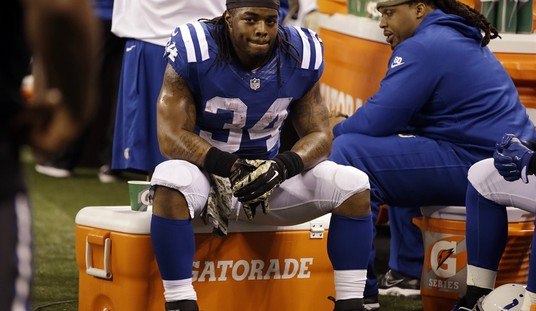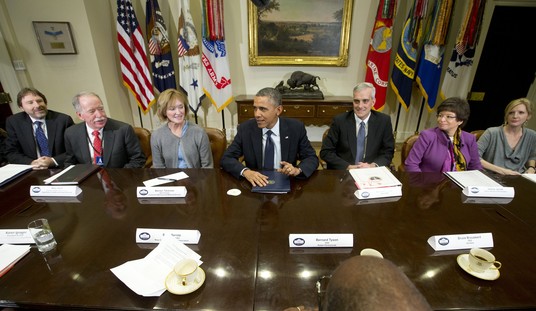What do you want first — the good news or the (possible) bad news? We have a mixed bag today on the vaccine front of the COVID-19 pandemic, which are even mixed within themselves. Let’s start with the good news from Pfizer, whose Phase 3 trials of their two-stage vaccine appear to be approaching a successful conclusion. Their third-quarter report suggests they could apply for an FDA emergency-use authorization as soon as next month:
It said nearly 36,000 of the volunteers have already received the second of its two-dose Covid-19 vaccine. Pfizer has as been working alongside German drugmaker BioNTech on the experimental vaccine. It contains genetic material called messenger RNA, or mRNA, which scientists hope provokes the immune system to fight the virus.
In September, Pfizer expanded the enrollment of its phase three trial to up to 44,000 volunteers from the initial target of up to 30,000. The company said the expansion would allow it to further increase diversity in the trial as well as include adolescents as young as 16 years old and people with preexisting conditions.
The phase three trials are a critical last step needed to get the vaccines cleared for distribution. Three other U.S.-backed candidates are in phase three: Moderna, AstraZeneca and Johnson & Johnson. Pfizer expects to apply for an emergency use authorization with the Food and Drug Administration next month.
They’re already set to roll out forty million doses, with more on the way:
Pfizer, the pharmaceutical giant behind one of the coronavirus vaccine efforts, will be able to provide an initial 40 million doses of its vaccine in the US by the end of this year, its CEO said Tuesday.
Pfizer CEO Albert Bourla revealed the news while speaking to shareholders during a Q3 earnings call, saying he expected to be able to hand them over to the US by the end of the year.
Bourla also noted that new vaccine data was scheduled to come out this Friday, ahead of the Nov. 3 presidential election.
That information, however, will not be released until a week after the company’s data and safety monitoring board conducts its review of the drug, according to CNBC.
Pfizer said that the vaccine data won’t come before the election, but we pretty much knew that already. Getting it to the FDA by next month would still be great news, considering that the previous record for developing an effective vaccine was four years. The FDA still plans to conduct a rigorous if expedited review, now that the election pressure has faded, but it’s still possible that Pfizer could begin distribution within weeks. That could give a huge boost to efforts to contain a new rise in transmissions, both here and in Europe, and help keep the economic recovery going.
But here’s the kinda-sorta-maybe bad news, which might not actually be news at all. The immunity from vaccines might only provide a safety window of a few months, a study in the UK suggests. Post-infection antibody levels begin declining at that point, although no one is yet sure what that means:
British scientists have found that the number of people testing positive for antibodies has fallen by 26 percent over three months, raising questions about long-term protection from the virus.
Latest data from the REACT2 study, published Tuesday, showed that in a random sample of more than 365,000 adults in the U.K. from June to September, the presence of antibodies fell for all age groups. It fell from 6 percent to 4.4 percent over that time.
“We know seasonal colds can reinfect people every six months,” said Wendy Barclay, head of infectious disease department at Imperial College London, in a video call with journalists Monday. She added that COVID-19 shows a similar profile. …
“We don’t yet know what level of antibody is needed in a person’s blood to prevent reinfection,” said Barclay. This was “critical to understand,” since vaccines were being developed to generate an immune response, she added.
That is a critical problem with this report. A 4.4% level might end up being the baseline and still effective against re-infection. The rarity of re-infections at this point — now eight months into the global pandemic — suggests that whatever levels of antibodies get produced after this drop-off are sufficient for resistance for almost everyone who had an exposure before. How long that continues, and whether that baseline will continue to decline after several months or years, has yet to be determined.
Columbia University virologist and Forbes contributor Angela Rasmussen points out that a decrease to a baseline is actually normal, and doesn’t necessarily impact immunity. Rasmussen explained the murky implications of this study in a Twitter thread:
1. Antibodies drop to baseline titers that are undetectable by commonly used serology assays. There are still low levels of antibody as well as memory B cells that can rapidly produce more antibody in the event of re-exposure (anamnestic response).
This is not "waning immunity"
— Dr. Angela Rasmussen (@angie_rasmussen) October 27, 2020
3. Some people (possibly with mild infection) do not have long-lasting antibodies for whatever reason. They do not have sufficient memory B cells to mount an effective anamnestic response.
This is "waning immunity"
— Dr. Angela Rasmussen (@angie_rasmussen) October 27, 2020
However, this should underscore the fact that "natural herd immunity" is not the way to go. There are too many unknowns to choose this as a safer, easier path to population immunity vs a vaccine that undergoes rigorous evaluation in controlled trials.
— Dr. Angela Rasmussen (@angie_rasmussen) October 27, 2020
Note Rasmussen’s emphasis on natural herd immunity, which is accomplished by unchecked spread of an antigen. A vaccine provides an expedited herd immunity by defeating the antigen before it can start acute cases and spread further. Either way, we get to “herd immunity,” but mitigation and vaccination allow us to do so in the most rational and least traumatic manner possible. And point 3 explains the rare reinfections that we have seen, which means immunity after infection seems to be lasting a while longer than this study’s toplines would lead laypeople to believe.
Even if it only lasts a few months, however, there are two silver linings to that news as well. First, the bodies of those exposed/infected by COVID-19 will likely still have enough resistance to render future reinfections much less harmful, as happened with influenza after its eruption a century ago. We get annual vaccines to boost that mitigation, if not to avoid acute cases altogether. Second, if we get vaccines widely and rapidly distributed, it’s possible that we can kill transmission of COVID-19 through rapidly acquired herd immunity via that vaccination, plus the social distancing and mask-wearing behaviors we are currently using. That might wipe it out altogether, although vaccinations would likely continue for safety, especially among higher-risk populations.
Permanent immunity is the best possible scenario, of course. We may still find that permanent immunity is achievable for all but a handful of exceptions. But even if we fall short of that, the vaccines will have a huge impact, and we are way ahead of that cycle. And that’s good news indeed.








Join the conversation as a VIP Member